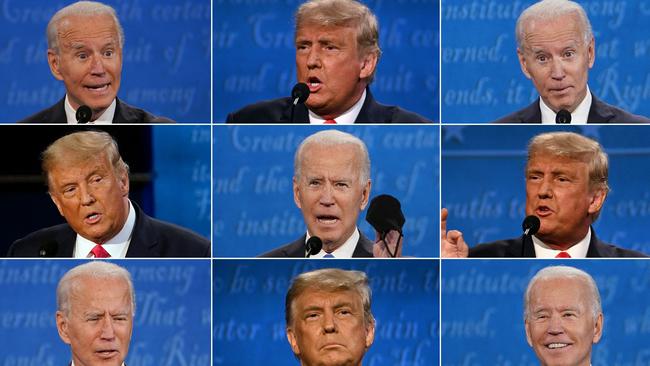
With polls suggesting a 76 per cent chance of a Democrat “clean sweep” of the executive and legislature, fiscal stimulus under a Joe Biden presidency is likely to include larger government spending, which should lift economic growth and inflation, supporting cyclicals and value.
Increasing conviction behind that view fuelled a rise in sharemarkets after the first presidential debate last month sparked a sharp widening in opinion polls and betting odds in favour of Biden, diminishing fear of a contested election result and giving hope of major US fiscal stimulus next year.
It’s a massive change in view from the 2016 US election, when markets correctly judged an unexpected win by Donald Trump was vastly better for equities as he boosted corporate profits by slashing the corporate tax rate and rolled back environmental and other regulations, while resisting pressure to curb share buybacks or carried interest, even as he started a trade war with China.
“While the net effects of punitive tariffs and trade disruption are debatable, this has been a solidly pro-corporate administration,” says Macquarie Equities head of Asian equities strategy, Viktor Shvets.
With the social cost of societal polarisation reaching highs not seen since the late 60s and the political system reflecting and reinforcing dysfunctionality in broader society, he says the social cost of decades of rising inequality and disruption are catching up with markets and politics.
“Societies are now demanding ‘fairness and equality’ rather than ‘freedom and efficiency’ and the choice facing the elites and corporates is whether they wish to reside in civilised societies or face their disintegration,” Shvets says.
The worst outcome he sees would be a disputed or inconclusive election leading to chaos.
Constrained Democratic rule “might be hobbled, with negatives not fully offsetting the positives”, while Trump’s re-election would “continue the current trend of disinflation and rising tensions”.
But while unconstrained Democratic rule would bring higher tax rates for corporates and high-income earners, as well as capital gains tax rises, greater environmental and financial sector regulation and a reshaping of the healthcare sector, it should fuel a stronger rebound in value stocks. Moreover, extra spending together with loose monetary policy and a defusing of social tensions would inject demand into the global economy, lowering financial risks and the US dollar.
“Thus, an unconstrained Democratic win should be globally reflationary and on balance good for value and emerging markets,” Shvets says.
From a local viewpoint, the investment bank’s Australian equities strategist, Matthew Brooks, feels the prospect of larger government spending under Biden should support global economic growth and inflation, with positive implications for cyclical and value stocks.
Brooks also expects commodities to be supported from the prospect of higher infrastructure spending and more activity generally, boosting Australian resources stocks, while reflation also raises the risk of higher US bond yields, and higher discount rates could be a drag on valuations of growth stocks.
Higher deficits and a lack of profit repatriation, which has been a tailwind since the Trump tax cuts, could also see a weaker US dollar, with supportive effects for the Australian dollar.
Brooks estimates that if the US corporate tax were to rise to 28 per cent in the 2023 fiscal year, from 21 per cent, it would trim earnings per share for the S&P/ASX 200 Industrials sector only by 1.3 per cent, which would easily be offset by the impact of higher US government spending on global growth. But stocks with high US exposure could be affected more by the tax increase.
Based on their US exposure, the EPS headwind for Appen, Janus Henderson, Incitec Pivot, Aristocrat, James Hardie, Sims, Breville, Cochlear, News Corp and Computershare would be at least 5 per cent.
“Higher fiscal spending could be an offset for cyclicals, but less so for defensives,” Brooks says.
But overall, he maintains that equities continue to rise in the “expansion” phase of the cycle.
Favoured value stocks in his strategy portfolio include GPT, Lendlease, Oil Search, Ampol, Worley, Seven Group, BlueScope, Telstra, GrainCorp, Crown Resorts, Sydney Airport, Westpac and ANZ.
He also prefers resources, given a positive view on commodities and the dollar. “The latter also gives us reason to prefer domestic stocks, a view that could be reinforced if Biden wins given his plan to hike corporate taxes.”
Meanwhile, Citi strategist Liz Dinh says Australia’s sharemarket underperformance versus global markets this year may be over, since Australia has been one of the most successful countries in managing the coronavirus and is experiencing stabilisation in employment and business conditions.
“Australian economic growth is on a recovery path and the balance of risks to company consensus earnings is to the upside,” Dinh says.
“With an improving domestic economic outlook, some of the laggard cyclical sectors may do better, such as insurance, financials and industrials.”
Resources should also perform well as China’s economic growth and industrial production are recovering rapidly and iron ore prices have remained resilient.







Value stocks, including banks and commodity producers, could be big winners in the event of a decisive win by Democrats in the US election next month, according to Macquarie Equities.